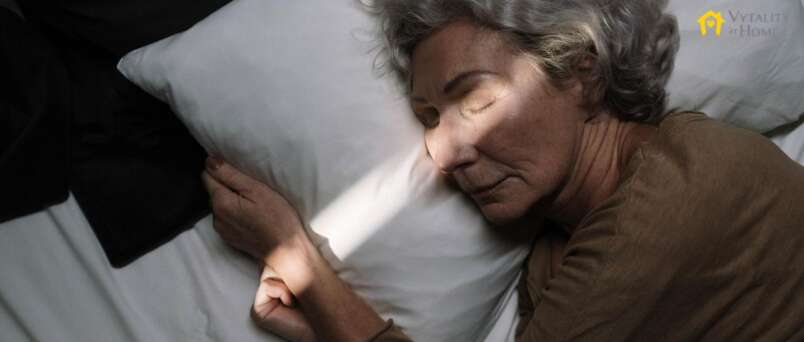Sleeping soundly; how to improve the quality of your sleep
Whatever our age, we still need as much sleep as adults, between 7 and 8 hours a night. However, as we age, the quality of our sleep may change.
Our sleep patterns are controlled by our body’s internal clock, known as the suprachiasmatic nucleus (SCN). This comprises of around 20,000 cells located in our brain’s hypothalamus, and controls our 24-hour daily body cycles, known as circadian rhythms.
These rhythms affect
- When we feel get hungry
- When our bodies release certain hormones
- When we feel sleepy or alert
As we age, so does the SCN, and its that deterioration in function that may disrupt our circadian rhythms and affect when we feel sleepy or wide awake.
Look towards the light
Changes in light are powerful cues for our bodies to maintain our circadian rhythms. However, research has shown that many older people simply don’t get sufficient exposure to daylight, some as little as 1 hour a day.
It’s a particular problem for those in care homes with fewer opportunities to experience natural daylight. Darkness is also important, as our aging bodies secretes less melatonin in response to darkness, which helps promote sleep.
The good news is that increasing our daily exposure to natural daylight or even bright lights can help reset our rhythms again.
Physical health and sleep
Our mental and physical health, and the medication we take for health conditions, can affect our sleep too. According to The Sleep Foundation:
“Conditions that commonly affect sleep in older people include depression, anxiety, heart disease, diabetes, and conditions that cause discomfort and pain, such as arthritis.”
This may result in those with multiple health conditions getting less than six hours of sleep.
Do daytime naps affect our night-time sleep?
There’s no conclusive proof, but it appears that when we age, we do nap more, but for less time. The general consensus seems to be that naps of up to 30 minutes can be beneficial, but that extended naps or naps taken late in the day would adversely affect night-time sleep.
Sleep hygiene for seniors
One of the simplest ways to improve your quality of sleep is to develop a sleep routine that encourages quality sleep – and stick to it. Some top sleep hygiene tips for seniors include:
Take daily exercise
You’re more likely to sleep if you are physically tired. This doesn’t mean seniors need to exercise before bed, just take some exercise during the day at some point.
Bedrooms are for sleeping (mostly!)
Remove distractions such a tvs smart phones and tablets, and keep your lights at low levels. It’s more romantic too! Keep your bedroom cool too at around 75 degrees Fahrenheit.
Avoid alcohol, tobacco, and caffeine
These stimulate your body, making falling asleep more difficult. One study showed that caffeine can disrupt sleep for longer than six hours after drinking coffee.
Eat your main meal at midday
Don’t eat your main meal later at night – eating your main meal at midday gives your body time to digest.
Limit your fluid intake
Remain hydrated but don’t overdo it if you are prone to needing to go the bathroom during the night.
Stick to a sleep schedule
Go to bed and wake up at the same time every day. As we age, we find it a lot more difficult to ‘catch up’ on lost sleep.
Develop your perfect bedtime routine
The aim is to bed relaxed by winding down before bedtime. Switch off the tv and read a book, take a bath, and perhaps have a warm milky drink.
If you have difficulties with sleeping which is affecting your physical and mental health during the day, seek advice from your doctor, a sleep clinic or a sleep specialist. The same applies if you have suspect you have a sleep disorder including insomnia, sleep apnea, or restless legs syndrome.
How Vytality at Home can help
Our experienced caregivers can help you improve and maintain your sleep hygiene and routine in so many ways! Our caregivers can:
- Help you take your exercise during the day
- Keep your mind active with brain puzzles and activities.
- Ensure your bedroom is clean and tidy
- Help prepare your midday meal and/or a light supper at night
- Provide personal care to help you prepare for bed at night and / or get up the next morning
To discuss your particular requirements:
Getting comfortable
Most of us have a favourite sleeping position, whether it on our back, our side or our stomach. Each position has its own advantages – and drawbacks.
• Back sleepers
Sleeping on your back reduces pressure on your spine, and can ben beneficial for those with neck or back pain. With a proper pillow for support, this position may also help reduce tension headaches.
The drawback is that it’s the sleeping position in which your airway is mostly likely to collapse, causing you to snore.
• Side sleepers
People who sleep on their left side say they feel most comfortable in bed. This position prevents putting pressure on the liver and facilitates healthy blood flow to the body, kidneys, and heart. However, it can increase pain for those with shoulder problems.
• Stomach sleepers
Sleeping on your front open the airways and reduces snoring. However, it also places more pressure on your spine as you need to turn your head to one side or the other.
• The best sleep positions for seniors
As we age, we might need to modify our sleeping position. According to one physiotherapist:
“Stress surrounding maintaining the perfect sleeping position only adds another barrier to getting to sleep efficiently and getting the hours we need.
Find the position that is most comfortable for you and allows you to get to sleep easily. Once you’re asleep, your body is likely to move about as you sleep anyway.”
Better sleep post pandemic?
Interestingly, a third of Canadians report that their ability to sleep is worse than it was three years ago. According to a survey by Narrative Research and the Logit Group:
“Two thirds (68%) of Canadians get four or more nights of restful sleep in a typical week, while a third (32%) get three or less.”
Women are more likely to have less than four restful nights of sleep a week.
This is concerning because, according to Statistics Canada, insufficient sleep can lead to increased risk of cardiovascular disease, type 2 diabetes, mental and cognitive disorders, accidents, injuries, and irritability.
Senior home care with Vytality at Home
To discuss your particular requirements for home care for you or a loved one, including respite cover for live-in caregivers so they too can get a good night’s sleep:




